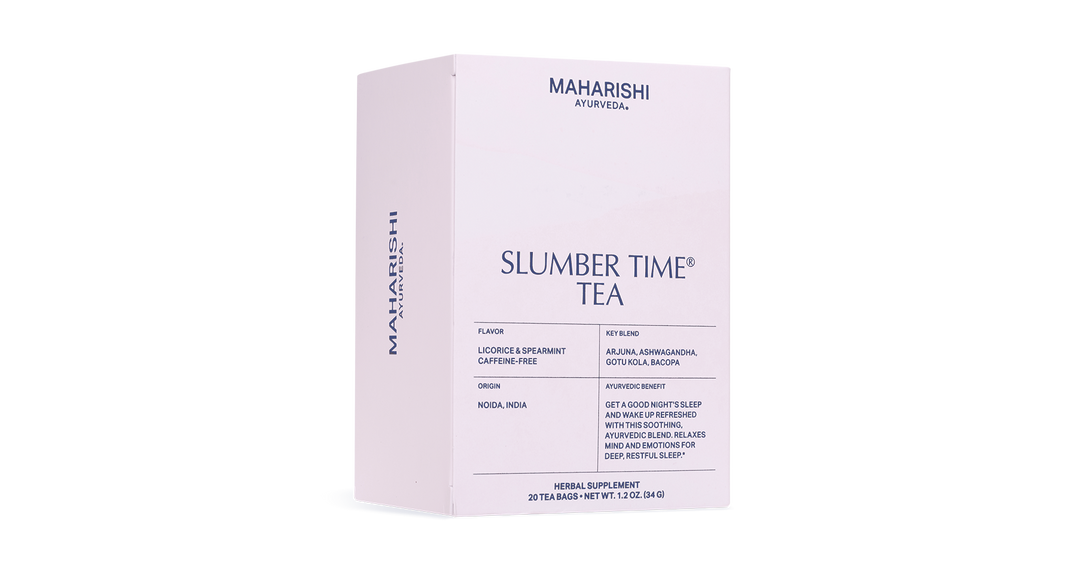Ayurveda for
Better Sleep
The Ayurvedic Perspective on Sleep
In Ayurveda, sleep is one of the pillars of good health, and many of the Ayurvedic tips for getting a good sleep involve making mindful choices about your diet and routine throughout the day. But first, it's important to understand the source of your particular sleep imbalance.
Short term strategies
Promote restful sleep with synergistic herbal supplements.
Ayurvedic Supplements to Help You Sleep
The ancient texts of Ayurveda recognize three different types of sleep, each one associated with the 3 doshas—Vata, Pitta, and Kapha—subtle energies that govern your mind and body’s functioning. Let’s explore these different sleep imbalances now.
How Can We Support Your Sleep Today?
If you've been lying in bed for hours before falling asleep at times, your mind spinning with thoughts, you may have a Vata imbalance. Vata is the Ayurvedic mind-body energy (dosha) associated with air and space. Vata sleepers may toss and turn before finally falling asleep. If this sounds familiar, try unwinding with our calming, Vata-Balancing Blissful Sleep formula.
If you occasionally wake up between 2–4 a.m. and have a hard time falling back asleep, you may have a Pitta imbalance. Pitta is the Ayurvedic mind-body energy, or dosha, associated with fire and water. Pitta’s fiery influence can heat up your mind and emotions in the early hours of the morning, disturbing your sleep. To counter Pitta’s warming influence, try our soothing Pitta-balancing Deep Rest formula.
Oversleeping on occasion can be a sign of a Kapha imbalance. Kapha dosha is the mind-body energy associated with earth and water. An excess of Kapha’s wet, heavy influence can make a person feel lethargic, unmotivated, and prone to oversleeping. To support healthy sleep and vitality during the day, try our Kapha-balancing Fatigue Free formula to support daily alertness and healthy sleep at night.

Sleep & Your Health
We’ve all been there. You watch one Netflix episode, and then another, and suddenly it’s midnight. The next day, you feel exhausted and unhappy—plus your digestion is out of whack from that late-night snacking! The effects of lack of sleep are real. Studies on sleep and productivity show that people who don’t get enough rest at night find that it may affect their focus, attention, and memory. Stats on occasional sleep issues show that the underslept may find that it affects their emotions and make them more prone to stress.
Your Circadian Rhythms & Ayurveda
The Ayurvedic Clock

Daylight plays a key role in your body’s innate rhythms. At night, when the sun drops down, your body produces melatonin, a hormone that helps you sleep. In the morning, the sunlight signals your body to slow the production of melatonin, so you feel more alert.
Seen through the lens of Ayurveda, your circadian rhythms are actually in sync with the doshas. The Ayurvedic day begins at sunrise, during Kapha’s drowsy daytime cycle. The sun rises to its peak in the sky at noon, during Pitta’s daytime cycle, when the sun is at its height and your digestion is strongest.
In the early afternoon, Vata’s spacious energy predominates, giving you creative energy for intellectual pursuits. As the sun drops on the horizon Kapha’s evening cycle kicks in, leaving you feeling sleepy and ready for bed. During Pitta’s evening cycle, your body’s crucial rest and repair mechanisms predominate. And finally, in the early hours of the morning, Vata’s evening cycle leads to fluid dreams and brain rejuvenation.
One of the best ways to ensure sound slumber is to follow the Ayurvedic sleep cycles and get to bed by 10 p.m. It’s also beneficial to follow your body’s natural rhythms—as illustrated above in the Ayurvedic clock—throughout the day.


The Ideal Ayurvedic Sleep Time
Diet Tips for Sleep

When you eat is just as important as what you eat
Ayurvedic experts recommend eating your largest meal of the day around noon (during Pitta time), when your digestive fire is at its strongest.

Make dinner a light meal
Eating a large meal at night can tax your digestive system and interfere with your body’s nightly rest and repair processes. When possible, favor light fare like soups and stews for dinner. And try to avoid eating anything a few hours before bedtime.

Eat meals in a quiet, settled environment
Support your digestion by eating in a quiet environment free of distractions like your cell phone and TV. Try to avoid having intense or focused conversations while eating. When your mind and emotions are relaxed, you’re better able to digest your food.
Plants, Spices, Herbs & Teas to support Sleep
Aside from the more traditional Ayurvedic herbs like ashwagandha and Indian valerian, there are a few more plant-based sleep supporters you should know about.

Lavender
This fragrant flower is well known for soothing the senses. That’s why we’ve chosen it as a key ingredient in our soothing Slumber Time Aroma Oil.

Nutmeg
Did you know that this humble spice has a calming effect on the mind and body? Try a sprinkle in a mug of warm milk before bed.

Mint
Mint has relaxing properties and cools the mind, making it an especially good choice for those with Pitta sleep imbalances.

Ashwagandha & Valerian Root
When it comes to Ayurvedic sleep supplements and herbs, the two most celebrated botanicals are ashwagandha and valerian root. Both have many unique benefits that can support a good night’s sleep. Indian Ashwagandha root is an Ayurvedic adaptogen, a potent ingredient that helps your body naturally adapt to stress. Valerian root is a calming botanical that helps your mind to disengage from the day’s worries so you can fall asleep.
Recipes to Support Sleep

Summer Pasta for Pitta

Spring Pasta for Kapha

Classic Ayurvedic Rice Pudding
Rice pudding is an ancient dish enjoyed by many cultures throughout history. It is perfect for the cold season, delicious, and is associated with good nutrition, easy digestion and satisfaction. It is also famous as a balancing food—it was mentioned in Ayurvedic medical texts before it was mentioned in cookbooks.
Other Natural Strategies for A Better Night’s Sleep

MEDITATION FOR SLEEP
Studies show that meditation is an effective tool for helping to curb stress—one of the key culprits behind sleep troubles. The Transcendental Meditation (TM) technique is one of the best-researched meditation practices.
Numerous studies show that TM not only helps to curb stress during the day, but it can also help you sleep better at night. Adding meditation to your daily routine is one of the best things you can do for your overall well-being.

Yoga for sleep
Yoga is the “sister science” of Ayurveda; the two practices are inseparable. The word “yoga” means “to yoke” or “to unite.” That is the goal of yoga: to unite your mind with its highest self. It’s true that the practice of yoga does include stretching and bending to tone the body, but it also includes meditation to tone the mind. We’ll talk about meditation in a moment, but for now here are three soothing poses you can incorporate into your bedtime routine.

Breathing for sleep
Breath is intimately connected to your body’s natural relaxation response. When you are stressed, your breath naturally becomes more shallow. Conversely, when you’re relaxed, your breathing becomes slow, steady, and calm.
With that in mind, you might want to incorporate Ayurvedic breathing exercises into your day to help you sleep better at night. Pranayama (alternate nostril breathing) is an easy, relaxing breathing practice you can do before your morning and evening meditations to help calm your mind and nervous system.




